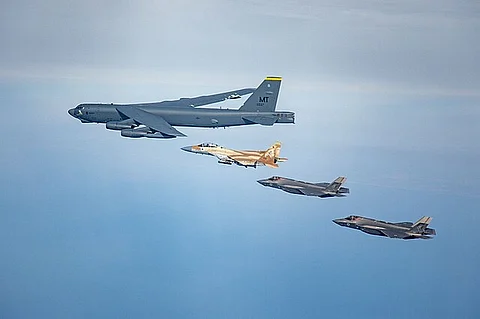

Israel is reportedly poised to launch a military operation against Iran, according to multiple U.S. and European officials, prompting heightened regional tensions and U.S. actions to withdraw diplomats and military dependents from the Middle East.
The U.S. State Department ordered non-emergency personnel to leave Iraq on Wednesday, citing "heightened regional tensions," while the Pentagon authorized the voluntary departure of military family members from the region, including Navy and Marine families in Bahrain.
A senior Navy official noted that there are no current plans to reposition the U.S. aircraft carrier Carl Vinson, stationed in the Arabian Sea with advanced F-35 stealth fighters.
U.S. Diplomatic Efforts and Iranian Response
Amid these developments, President Trump’s Middle East envoy, Steve Witkoff, plans to attend a sixth round of nuclear talks with Iran in Oman, despite Trump’s growing pessimism about a diplomatic resolution.
Trump told reporters at the Kennedy Center on Wednesday, “Well, you’re going to have to figure that one out yourself,” when asked about the personnel withdrawals.
Iran’s Defense Minister, Gen. Aziz Nasirzadeh, warned that if nuclear talks fail and conflict arises, “America will have to leave the region because all its military bases are within our reach and we will, without any consideration, target them in the host countries.”
However, an Iranian official told Al-Jazeera, as reported by Middle East Spectator on Telegram, “There is no indication of military tension between Iran and the United States,” suggesting a divergence in Tehran’s public messaging.
The U.K. Maritime Trade Organization issued a warning on Wednesday, advising commercial ships in the Persian Gulf, Strait of Hormuz, and Gulf of Oman to exercise caution due to potential military escalation.
The International Atomic Energy Agency reported that Iran has enriched 408.6 kilograms of uranium to 60% purity, nearing weapons-grade levels, a significant increase from 274.8 kilograms in February.
A censure resolution against Iran, proposed by the U.S., Britain, France, and Germany, is set for a vote on Thursday, potentially leading to restored U.N. sanctions.
Iran’s Foreign Minister, Abbas Araghchi, warned on social media that censure “will compel Iran to react STRONGLY.”
As tensions rise, U.S. oil prices hit $68 a barrel, reflecting concerns over potential disruptions to global oil supplies.